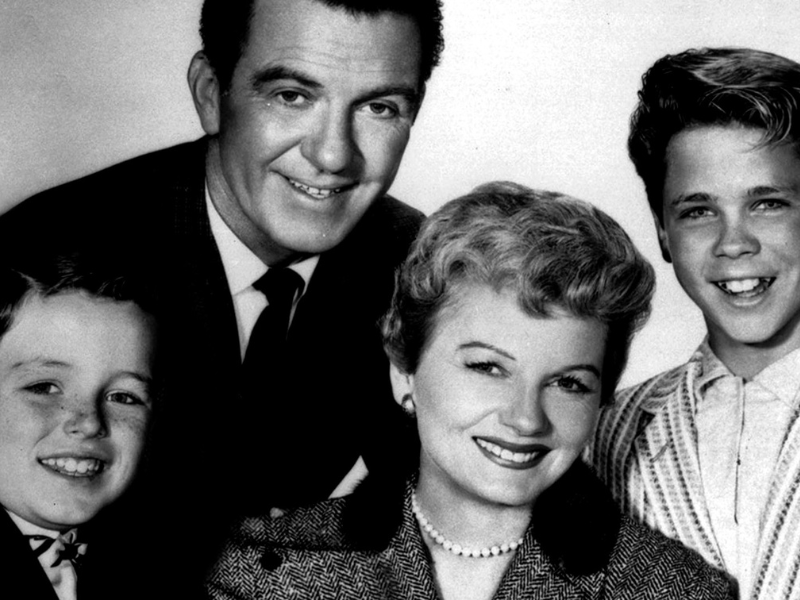In the past half-century, America seems to have swung from a conformist social ethic to a radical individualistic social ethic. Prior to the 1960s, the social norms of the nuclear family, single-family detached houses and commuting to work were promoted through television programs such as “Father Knows Best” and “Leave it to Beaver.” With the 1960s, a counter-culture was promoted featuring new manners of dress and sexuality. That this was a “counter-culture” indicates that there was still a cultural norm. But, with the passage of time, the prior cultural norm faded away and, nowadays, we see a nation deeply divided along cultural lines.
According to Aristotle, in Politics, society consists of so many households within which values are mostly shared, along with a polis, or political-order, within which few values are shared, perhaps only the need for mutual defense. As further developed by others in the tradition of Aristotle, society consists of three parts: (1) morally-free and autonomous persons, (2) the political order, and (3) a complex voluntary sector in which persons join with others in various ways to pursue the values that are shared within those social institutions. For example, people join into households and into business organizations. In this view, freedom of association and social institutions are very important parts of a free society.
A contrary view is that of Plato, as developed in The Republic. In this contrary view, society should be a totalitarian commune organized to pursue the values determined by the elite to be the correct values. Importantly, there should be no private property and no families. There should be nothing that would give rise to individuality. All production and distribution is to be directed by the commune; and, men and women engage in free love with any children that come along raised by the commune.
To be sure, particular forms of communes can vary tremendously. During the 19th Century, the voluntary communes of Charles Fourier, Robert Owen, various religious sects and others varied enormously in their internal organization and, more fundamentally, in the values they pursued. Some were materialistic, and some were other-worldly. Some featured traditional families, others free love and yet others celibate. Few lasted very long, and those that did last tended to make significant compromises with egoistic concerns.
Karl Marx considered himself to be a scientific socialist in contrast to what he called the utopian socialists. Marx foresaw the need for a relatively small “vanguard of the proletariat” to transform society and the nature of mankind. In particular, public schools were to indoctrinate children, and, along with this, there was to be widespread censorship of speech and expression, along with incessant war and deprivation.
In the 20th Century, Herbert Marcuse expanded on Marx’ concept of (economic) class to encompass other forms of social division. In particular, there could be a wide variety of households dependent on sexual orientation. Significantly, Marcuse separated desire from duty through the assumption of abundance. By reason of abundance, individuals need not concern themselves with the consequences of their actions and are thus freed to pursue their desires. Indeed, suppressing one’s desires because of consequences is viewed as a form of repression. Not only is there no economics, there is no morality.
In Iran, a theocratic state promotes extremely orthodox social views. Iran features an all-powerful Ayatollah (or, supreme ruler) and a self-perpetuating Council of Guardians that screens candidates for political office. The state controls schooling, speech and expression, conditions employment on correct behavior, and tolerates hooliganism to promote Shi’a Islam. While the various forms of totalitarianism vary widely in the values they promote, they all share the will to power; that is, the willingness to use the power of the state to promote their values.
For some people, the opposite of totalitarianism is individualism; indeed, it is rugged individualism. All social institutions are to be shunned. People should engage with each other only through anonymous transactions in the marketplace. Who needs anybody now that we have Amazon?
Actually, buying from Amazon presupposes the existence of a social institution; in this case, a worldwide business with thousands of employees, shareholders and suppliers, along with mechanisms that promote trustworthiness in transactions. Economies of scale in production and in reputation impel the organization of business. To be sure, as goods are more like commodities, markets more conform to the economic model of perfect competition. But, perfect competition is an idealized concept. Most of the real world conforms to the more complex model of monopolistic competition, with position in the marketplace joining price and quantity. Indeed, most of the things bought on Amazon are brand-name consumer goods, defined by (objective) specification and (subjective) reputation, in addition to price.
As we move away from transactions in the marketplace to the full range of human interaction, we have to deal with relationships. These relationships range from chance meetings as in passing another person on the street, to the intimate relationship of a husband and a wife. Economists nowadays describe relationships as repeated games in which you realize that how you treat others affects how they treat you. Repeated games promote fairness and even kindness, generosity and charity. As Americans have become increasingly divorced from each other and dependent on the state apparatus, it should not be surprising that they have become more coarse, more dishonest and more violent.
We can differentiate totalitarianism from a free society as follows: In communism, the rule is “to each according to his needs (as determined by the state), from each according to his abilities (again, as determined by the state)”. In capitalism, the rule is “to each according to how he is chosen (by others), from each according to how he chooses”. Being chosen by others is one of the most rewarding experiences in life, and not being chosen can be devastating.
While joining into social institutions is part of a free society, there are times when a person is called to be a leader, and even times when a person is called to be a loner. Leaders play vital roles in the real world as agents of change, whether as inventors, innovators or explorers, all of which might be subsumed by the word “entrepreneur.” Sometimes we think of entrepreneurs as risk-takers, in the sense of weighing cost and benefit in the context of uncertainty. Sometimes we think of entrepreneurs as acting on keen insight. But, in either case, we are talking of those who act first and, so, move the world. They are leaders in the sense of being out in front, but still in contact with others.
Then there are loners. I am not talking about those who become hermits because they are anti-social. I am talking of those who, like Lao-tzu, are impelled to leave society because it has become irredeemably corrupt; and, John the Baptist, a voice crying out in the desert, someone who is premature but prepares the way for another. I am talking of the martyrs who are willing to sacrifice everything for their dearest, most precious values. For example, in witness of the truth. For another example, for love of others, such as one’s family, one’s comrades, and one’s country. And, I am talking of people who are devastated such as by being betrayed in love, who nevertheless make the decision to be a survivor. These are people who are strong-willed, courageous and think independently. Free people are leaders and loners, as well as joiners. So, yes, free people must be rugged individuals.





